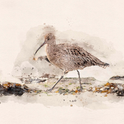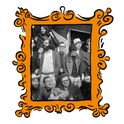In the summer of 1968-as it happened, the year of Mervyn Peake's death-three young men were sharing a breakfast table on the Orient Express as it crossed European Turkey. I had joined it at Salonika, where on the platform I had seen my first junkie (he was asleep on a bench with his eyes open but rolled back; long beatnik hair; a figure both fascinating and repulsive). This wasn't the Orient Express of today, a glossy product of the nostalgia industry, but a descendant of the original; its dilapidated Ottoman carriages filled with the air of a dead empire.
The first traveller asked: "Have you read Lord of the Rings?" The second replied: "It's wonderful, my favourite book! Have you read it?" He was looking at the third-me, 19 years old and on my first solo journey abroad. I had never heard of Lord of the Rings. "My God!" exclaimed the second in disbelief. Our bread, goat's cheese and tea in glasses arrived. "However," said the first, who was no older than I, but who had the authority of one who had already travelled in unusual places, "the Gormenghast books are much better." I hadn't heard of those either, and neither, thankfully, had the second. As we steamed slowly into Istanbul, I looked out of the window. Beside the track lay a body covered in flies. I turned my head in excitement as it receded behind us. My first corpse, too.
Back in Oxford that autumn I duly read Lord of the Rings. It wasn't for me. Too fey and superficial. Then I turned to Titus Groan, the first volume of Mervyn Peake's trilogy. This was the real thing. A discovery. A new world. A masterpiece. It was as though Edgar Alan Poe's House of Usher had failed to fall and grown instead ever more monstrous and eccentric. The second volume, Gormenghast, was finer still as a prose performance, while the third, Titus Alone, was altogether different: shorter, more modernistic, uncompleted at Peake's death from Parkinson's disease (his degeneration was rapid). This third volume is sometimes dismissed but, as I wrote in an encyclopaedia entry on its author: "After the incestuous density of its predecessors, the space and speed of the third is one of fiction's great dislocating events. The mind, coffered into the elaborate chambers of Gormenghast, is suddenly reeling across phantasmagorical landscapes which belong, if anywhere, to the future... Peake's illness has introduced an urgent rhythm that is quite unexpected."
In 1970 my friends and I were taking quite a lot of LSD in my rooms at Folly Bridge, overlooking the Isis. To soundtrack these trips, I used to visit the record department of Russell Acott in Oxford's High Street. One of my discoveries was an album called Monster Movie, by a German group, Can. It had something in common with the Velvet Underground, but the latter were more about songwriting and Can were more musical. They had none of the Velvets' ramshackle quality. They recorded in a castle in the Rhineland and were far more experimental. Even Can's lead singer, a black New York sculptor, seemed to have arrived via the Paris of James Baldwin. Later he was replaced by a no less remarkable Japanese busker. Can even asked if I wanted to be their singer. I thought about it, but was afraid-for my writing, among other things. Writing is like living in the centre of a huge city. It is difficult and stressful, and if you get out of it for long, you are unlikely to be able to return.
This attitude to singers was in keeping with Can's philosophy of trusting the accidental. It gave them great freedom in live performance, but was balanced by an equivalent rigour when rendered permanent on record. It was the pre-digital age; their studio work often involved thousands of painstaking micro-edits of magnetic tape, a technique deriving from Stockhausen.
Soon after leaving university I wrote to the Spectator, saying how disgraceful it was that they had nobody under 40 writing for them. The editor agreed and gave me a column on pop culture. I was 21. It was a free ticket to almost anything, and one of the first things I did was fly to Cologne to visit Can. We clicked, and became friends. I began to give them some assistance with lyrics and titles. I also discovered that their unusual sophistication was the result of having come out of the European classical world-including its avant-garde (Ligeti, Stockhausen, the Darmstadt summer school). My work with Irmin Schmidt, Can's co-founder, became more systematic. We wrote songs together (two albums of which have appeared) and had many conversations through the night. He told me about Cioran, Pessoa and Scelsi. I told him about Mervyn Peake, Silvestrov and Morton Feldman. At that time we seemed to have complementary desires: as a composer Irmin wanted to read everything, as a writer I wanted to hear everything.
One day he rang me in great excitement: "You know Mervyn Peake? He's just come out in Germany. It's incredible writing! Now I want to read it in English." The next time we met he told me it was even more incredible in English, which is, of course, true. He then exclaimed: "It's an opera! And I want you to write the libretto."
This had never occurred to me, but he was right. It was a natural for an opera. And not some footling, clever-clever, post-modern, minimalist, anti-opera opera. It was grand opera. The only thing was that I didn't want to write the libretto. For me it was a great novel, a spell-binding river of gorgeous prose. I did not want to interfere with that. Besides, in opera all the glory goes to the composer-and the singers. I remained adamant. I didn't want to do it. And I was going off to Palermo. "You'll do it in the end. I know you will," Irmin Schmidt said. He was right.
There were two reasons why I changed my mind. The first was the reason why I write my books-if I don't write them nobody else will. The second was that Irmin, with the help of the late Claus Henneburg and Klaus Emmerich, produced a five-page scenario minus an ending. This liberated me from the problem of interference. He had taken the first iconoclastic step in hammering the masterpiece into another shape. This also had the effect of liberating me from Peake. I entered upon the task without reference to his writing except at the instinctive level-this libretto is not an adaptation of Gormenghast but a reinvention of it. Instead, I realised when I had finished it that not only was my stylistic range much wider than Peake's, but that not a single phrase of his appeared in the libretto. (As a conscious gesture I then inserted one phrase taken from the books.) And yet the result is, I feel, authentic. It is Gormenghast.
Funnily enough, at no time did I question my ability to write a libretto. I had never written a libretto before-but it's all words. I can do anything with words except advertising copy and popular novels. So Irmin and I began talking. And talking. Initially he wanted a more mannered and symbolic vision of the work, influenced by his love of Peking opera. I wanted a human drama with "real" characters. I won.
Timing was still a problem. I went to Palermo and came back. But now I was going off to St Petersburg. I thought this would pull me in a direction contrary to that of Peake's English macabre. I was wrong. Although St Petersburg is not a castle but a classical city, it is a very personal, unified and tentacular creation. Trapped in the past, curiously futuristic, another gorgeous northern nightmare, St Petersburg might be seen as Gormenghast's sister.
I returned from a long summer there, inspired by life and obsessed with a person. The experience had been fabulous, upsetting, profound. I had many notes for the book which would become One Hot Summer in St Petersburg, but I pushed them aside and fixed my thoughts on the libretto. It was when I returned to St Petersburg, the following winter, that I embarked properly on the first draft. I rented a flat on the Millionnaya where everything was decayed, dusty, charged with drama.
And I wrote in a feverish distraction from the anxiety of waiting for the friend who often did not turn up. Outside the snow fell like white fur in the long night. Sometimes the sun shone out of a blue sky on a city of crushed diamonds. The Neva river froze, squeaked, thawed, hissed, refroze in ever more fantastic shapes. I had always imagined a frozen river to be smoothish, but no, the surface was uneven, jagged, a mass of interlocking ice sculptures. And always my skin tingled in anticipation of my friend's arrival. He is two hours late. Maybe he will come. I paced the room, spouting couplets and songs and weird snaking phrases, smoking again for the first time in 15 years, underslept, overslept, too sharp, too spaced, terribly excited, open and alive. Sometimes my friend did come, and I was the happiest I've ever been, calm and completed. But often he didn't; and I smoked, paced, sat down to write, jumped up, sat down, perfected, altered, reperfected. One Russian said to me: "Yes, you now have a very St Petersburg face-exhausted, with wild, alive, eyes." The first draft, far from perfect, was finished in four weeks.
When Irmin and I had written songs, sometimes the words had come first, but more often the music. In this case Irmin wanted the libretto before he began composition. Hence it was important for me to vary the surface of the text to provoke songs, arias, recitative of differing character and shape. Although the theoretical background had been thoroughly debated between Irmin and myself, when it came to writing down words I was given a free hand. Thank goodness-because I cannot write without a large degree of autonomy. Libretto modifications took place in the course of composition but there were surprisingly few of them. Indeed, once set in motion, there was a thrilling inevitability to what emerged.
I was aware, when writing it, of playing with influences-Cole Porter, Gilbert and Sullivan, Edith Sitwell, Milton, Shakespeare, Joyce and more. But nowhere is there pastiche. The associations are more like glints which appear in a half phrase, a rhyme, a reference. Something similar is probably true of Irmin's music. For example, in Act One, Scene Two, the cook Swelter makes his appearance in the Great Kitchen. The aria is called Be a Happy Carnivore! However, it emerged as if G&S had been written by the Marquis de Sade. Irmin knew none of this and I did not tell him. When he came to it he ran the words through his head and began to sway seductively-perhaps inspired by the couplet "I swoon at the thought/Of thighs simmered in pork"-but as the Straussian melody evolved it seemed to have been written by Shostakovitch-and then set to reggae. The opera was reading and sounding like nothing which has ever gone before.
The score will be mainly in the form of prepared tape, with only a string quartet, percussion and singers playing live. The music is projected through four stereo systems, so a future producer who wanted, say, to use live strings would be able to do so. For me, the great advantage of using tape and all the modern technology which accompanies it, is that perhaps for the first time on a significant scale an opera house can be filled with a truly epic, cinematic sound. Even Wagner never had that. This is especially important given the character of Irmin's music which, although contemporary and rhythmic, incorporates vast shifting sheets of ravishing Debussyesque chromaticism. That it is projected electronically enhances its eerie moodiness and beauty.
So what is it we have brought forth? A large three act work, yes. A grand spectacular opera, yes. A modern opera, yes. A rock opera, yes. A fantasy opera, yes. An avant-garde opera, yes. A strange new thing sung in English yet premiered in Germany, yes. That will be too many yesses for some people. But I can stop here. It is now running in Wuppertal, and it is the job of other people to tell us what we have made.
Gormenghast
Wuppertal, Germany











